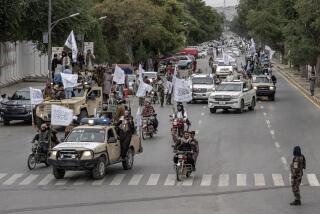Gap Narrows in Afghan Peace Talks
GENEVA â Talks on a peace settlement for Afghanistan recessed Tuesday with the gap for agreement on a timetable for withdrawing Soviet troops now narrowed to âless than a year,â according to U.N. mediator Diego Cordovez.
The Pakistani and Afghan foreign ministers have returned to their capitals for consultations after meeting separately with Cordovez on Monday, and they will be back in Geneva to resume the negotiations âsoon, within two months, not more,â Cordovez told a news conference.
Agreement on a timetable for pulling out Soviet troops is the only issue still to be settled, according to Cordovez. He said that âconsiderable progressâ has been made in narrowing the gap in the past two weeks.
18-Month Deadline
âThe gap last May, when we first addressed ourselves to the question, was 45 months,â he said. âIn August . . . it was down to 32 or 33 months. Now the gap is less than a year.â
Although the U.N. mediator declined to be more specific, it is understood that the Afghans now would accept an 18-month deadline for the Soviet troops to be out after peace is arranged. The Soviets, who had wanted four years to withdraw their troops, now are believed to be willing to accept 18 months. The Pakistanis, who had been insisting on a Soviet pullout within four months, have now agreed to seven months.
âThis is very significant movement down and I believe that what is left can be closed,â Cordovez said. âEach side shifted its position twice during the course of the last two weeks. The round has been difficult, very intense but encouraging. We have had more difficult problems on other issues in the last 4 1/2 years.â
Civil War Since 1979
Afghanistan has been caught up in civil war since 1979, when a Communist coup brought down the government and Soviet troops were sent in to support the new government. Pakistan has been involved indirectly because millions of Afghans have taken refuge there and rebel forces have made their headquarters in the country.
Representatives of the Pakistani and Afghan governments have been negotiating here sporadically since 1982 and have reached agreement on three parts of a four-part peace document. They cover superpower guarantees of Afghanistanâs status as a neutral, nonaligned state and non-interference in its internal affairs; arrangements for the return of the countryâs 4 million or so refugees, most of whom are in Pakistan, and provision for U.N. supervision of the Soviet troop withdrawal and other aspects of the settlement.
Cordovez acknowledged that the peace agreement worked out here would only be part of the process and that âother very difficult and sensitive issues are under discussion in various ways, synchronized with the process taking place here.â
He declined to be more specific, beyond saying that these were âpolitical questions involving reconciliationâ separate from the peace agreement.
Peace Settlement Questions
The principal problem is likely to be getting Afghanistanâs rebel tribes and political factions to accept a peace settlement.
More to Read
Sign up for Essential California
The most important California stories and recommendations in your inbox every morning.
You may occasionally receive promotional content from the Los Angeles Times.










